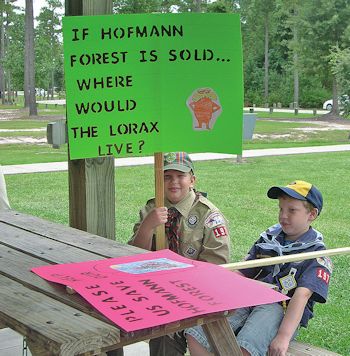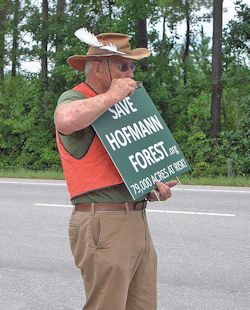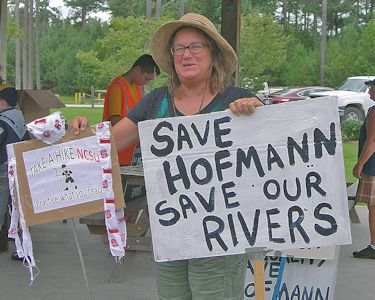Reprinted from the Tideland News of Swansboro
 Supporter SpotlightCub Scout brothers Ian O’Donnell, left, 10, and Reese O’Donnell, 8, joined their grandparents, Jim and Laura O’Donnelll, and father, J.P. O’Donnell, at the rally. Photo: Brad Rich, Tideland News |
MAYSVILLE — From Cub Scouts to retirees, folks from Sneads Ferry and over to Swansboro and Morehead City converged Monday at Deppe Park northeast of Jacksonville to protest N.C. State University’s planned sale of the 79,000-acre Hofmann Forest that straddles the Onslow and Jones county line.
About 75 people in all showed up, most carrying “Save Hofmann Forest” signs as they walked in orange vests along U.S. 17 amid a cacophony of blowing car and truck horns.
Some were singing, some were chanting “No sale, no way, Hofmann Forest has got to stay,” and one, Swansboro resident and retired educator Frank Gaines, even broke out a harmonica on the median in the center of the highway and played what he said was a song made popular by the Wobblies, the common name for the Industrial Workers of the World, during the labor movement fights in the early 20th century.
The one-hour rally and protest, which started at noon, was concurrent with a similar event in Raleigh on the campus of N.C. State University, which is trying to sell its research forest for $150 million to Hofmann Forest LLC. Jerry Walker, an Illinois agri-business owner, registered the company in North Carolina on Jan. 6, 2013, 12 days before the university’s Natural Resources Foundation, the official owner of the land, voted to sell the forest.
At Deppe Park, Michael Murdoch, a Morehead City-area resident and head of the Croatan Group of the N.C. Sierra Club, said he and the others believe that at a minimum, N.C. State should have held numerous open meetings and gone through the environmental assessment process before announcing the sale last year.
Supporter Spotlight
“It’s a huge forest and the impacts from development are potentially far-reaching,” he said. “While not all of the forest is pristine, we believe that turning it over for agricultural and commercial development could be devastating. The forest, even though it’s not really accessible to the public in general, is of tremendous benefit to the public, and it should continue to be preserved for that public benefit.”
The importance of the forest for education is what drew Gaines, a retired teacher. The university needs to focus on the value of research and the study of natural areas, he said, and Hofmann is nothing if not a gigantic lab.
Gaines’ sentiments were echoed by many at the park Monday. Some protestors, like Fred Cubbage, said they were astonished by the statements of some school officials that Hofmann is too remote from the Raleigh campus and is more valuable for the money it will bring than for the knowledge it could impart. Cubbage, a N.C. State forestry professor, has repeatedly said the forest remains valuable and that selling it undercuts the university’s often-stated commitment to natural resources protection and sustainability.
While Walker and the university have said there are no plans to develop the forest, those who oppose the sale have pointed to a “buyers’ prospectus” – disavowed by the seller and the buyer – that touts the forest’s potential for agricultural and commercial development.

Frank Gaines of Swansboro displays a sign showing his support for the Hofmann Forest while at the same playing a harmonica. Photo: Brad Rich, Tideland News |
The opposition, led by Ron Sutherland, a Wildlands Network conservation scientist, and Cubbage, who once headed the school’s forestry department, doesn’t believe the assurances and fear that development of the huge forest will destroy crucial wildlife habitat and increase stormwater runoff that will further pollute the headwaters of the White Oak, New and Trent rivers.
“Save Hofmann Forest,” a coalition spearheaded by Sutherland, Cubbage and Jones County landowner John Eddy, son of Elmer Eddy, the late and legendary “White Oak River Trashman,” filed a lawsuit to require the university to conduct an environmental assessment that they believe is required under state law.
The coalition lost the first round in District Court in Wake County last year, but has appealed, and a decision could come down from the N.C. Court of Appeals any day. The U.S. Environmental Protection Agency is also investigating potentially illegal ditching and draining of wetlands in the forest after the Army Corps of Engineers determined earlier this year that violations appeared to have taken place.
Opponents of the sale, meanwhile, are concentrating on public awareness. More than 11,000 people have signed petitions that oppose the sale; thousands of letters have been sent to university officials; and environmental groups, including the Sierra Club and the Izaak Walton League, have lent support for the cause. And television cameras were in abundance Monday.
In Raleigh on Monday, Sutherland participated in the on-campus rally and said at least 100 others did so, too. “We were assembled in the Brickyard in the shade of a large oak tree,” he said in an email late Monday afternoon.
Protestors distributed yard signs and bumper stickers and about 60 people marched to Chancellor Randy Woodson’s office to deliver the petitions.
“Our goal,” Sutherland added, “is to apply so much political pressure that NCSU can’t get away with closing the deal. In the end, we have provided Chancellor Woodson and his fellow administrators 11,000 different reasons why they would be smart to back away quickly from the Hofmann sale to Jerry Walker, and to restore NCSU’s public image by going back to the drawing board and seeking to build consensus about what to do with this extremely important tract of land. NCSU still has a small window of time to do the right thing here before massive public fallout and leadership turnover become inevitable.”
At Deppe Park, participant Jessica Hult, a resident of the Hadnot Creek area in western Carteret County, emphasized that she’s a Republican – not the usual politically liberal environmental activist – and is president of the White Oak River Chapter of the Izaak Walton League of America.
Hult said she wants to “take back” the word “conservatism” from those who’ve abandoned conservation. Her family, she said, has been involved in the league for many generations, and she believes Hofmann Forest is a key to the health of the area’s ecosystems.
 |

Michael Murdoch joined Monday’s rally at Deppe Park in Onslow County to protest the sale of the Hofmann Forest. Photos: Brad Rich, Tideland News |
“It belongs to ‘We the people,’ the citizens of the state of North Carolina, and it’s important to us,” she said.
Deede Miller, Murdoch’s wife, said she grew up in the area, moved away, came back not long ago and was astonished by the negative changes she saw in the coastal and near-coastal environment.
She got involved, she said, because she and other Sierra Club members in the region believe that any significant development within Hofmann Forest would accelerate the decline in water quality, a trend that’s manifested in increasing numbers of closed shellfishing water signs and swimming advisory warnings in rivers, sounds and even the ocean.
Miller and Murdoch said they were pleased by the turnout at the Onslow rally, calling it evidence that the movement to save the forest is getting public and media attention and is beginning to get the traction necessary to convince N.C. State officials and others that the sale is a bad idea, especially without a formal environmental assessment of the potential ramifications.
For others at the rally, the potential sale of the forest is important not just for water quality, but for wildlife. Craig Pelletier, a New York ironworker, bought a home and three acres near Maysville on the edge of the forest a few years ago, and fears for the bears, foxes, owls, coyotes, birds, wild turkeys, deer and even bobcats that call it home.
Indeed, ecologists view Hofmann as a crucial link between other protected areas, from Croatan Forest in Carteret and Craven counties to the wild areas of the Marine Corps Base Camp Lejeune in Onslow County and south to the Holly Shelter Game Land in Pender County.
Pelletier said he sees and hears that wildlife every day and night, and relishes it.
“My backyard is the Hofmann Forest,” he said. “I live in a terrarium. But it’s not just for me; it’s for everybody. There are fewer and fewer places like this in the country.
Cub Scouts Ian and Reese O’Donnell, 10 and 8, respectively, were carrying signs and at the rally with their grandfather, Jim; grandmother, Laura; and father, J.P. The family lives near Catherine Lake close to Jacksonville and all are avid wildlife enthusiasts.
Jim said he’s particularly concerned about the effects on birds, as he’s been a “birder” for many years and has participated in annual counts in the Hofmann. One time, he said, he and others counted 62 species in just a few hours.
“Although birds in North Carolina seem to be doing a little better than some places, birds overall are declining and this is important, a big habitat area,” he said.







